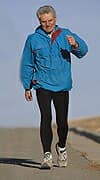In small study, resveratrol undermined gains in blood pressure, cholesterol and aerobic fitness
WebMD News from HealthDay

By Mary Elizabeth Dallas
HealthDay Reporter
THURSDAY, July 25 (HealthDay News) -- Although some antioxidants may be good, more may not be better. New research suggests that resveratrol, a natural antioxidant found in red grapes and products derived from them -- such as red wine -- could offset the health benefits of exercise in older men.
The study involved 27 healthy but inactive men, all nonsmokers around 65 years old. The University of Copenhagen researchers had the men engage in high-intensity exercise, which included full-body circuit training, for a total of eight weeks.
During this time, half of the participants were given 250 milligrams (mg) of resveratrol daily. The rest of the men received a placebo pill that contained no active ingredients. Neither the researchers nor the men involved in the study knew if they were taking resveratrol or the dummy pill.
Although physical activity improved the men's heart health, the study, published online July 22 in the Journal of Physiology, revealed that resveratrol supplements counteracted the positive effects of exercise on blood pressure, levels of fat in the blood and the capacity of the body to transport and use oxygen.
The men who took the placebo pills had lower blood pressure and concentrations of LDL or "bad" cholesterol and triglycerides in their blood following the eight weeks of exercise.
Resveratrol supplementation combined with physical activity, however, eliminated the reduction in blood pressure and blood fats, and led to a significantly lower increase in the amount of oxygen delivered to muscles during exercise.
The researchers also found that resveratrol did not affect the progression of atherosclerosis or hardening of the arteries. Their findings "add to the growing body of evidence questioning the positive effects of resveratrol supplementation in humans," they wrote.
Why this happened, however, remains unclear. "This is the million-dollar question, and the truth is that we don't know," said study corresponding author Lasse Gliemann, a doctoral student. "But one argument could be that free radicals (those removed by the antioxidants), although deleterious to cells when in excess, could be important in stimulating the training response. Thus, lots of antioxidants would remove all the free radicals and hence remove some of the training response."
Relatively high doses of antioxidants have not been effective in a number of larger clinical trials on a number of topics, said Dr. Michael Joyner, a physiologist at the Mayo Clinic in Rochester, Minn.
"Some people think you need at least a bit of oxidative stress to trigger or stimulate exercise training responses," Joyner said. "The same thing is true for inflammation. Too much is bad, but some might be required for normal physiological signaling."
In short, free radicals, which are thought to contribute to inflammation, aging and disease, may actually be necessary to trigger the body's healthy responses to exercise. So when it comes to antioxidants, how much is too much? Study co-author Gliemann said that more research is needed to answer that question.
source : Red Wine Supplement May Block Benefits of Exercise in Older Men








